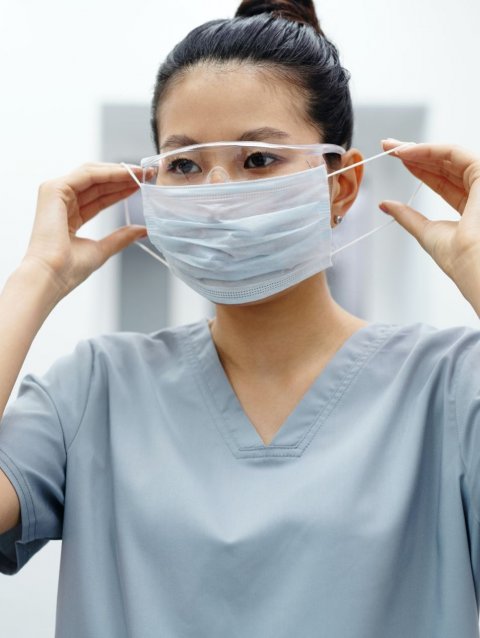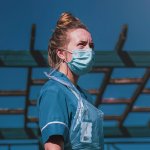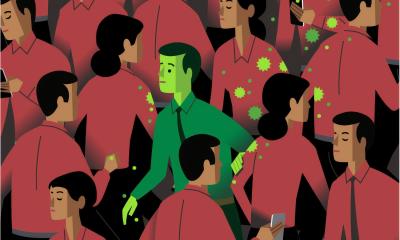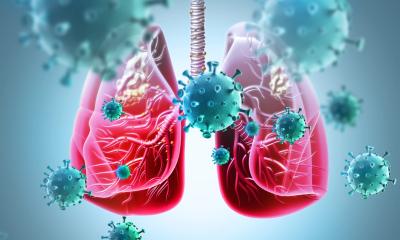News • Corona in healthcare workers
Covid-19 and hospital staff: many infections, but few re-infections
A study of healthcare workers shows they were three times more likely to become infected during the Covid-19 pandemic compared to the general population. Around one in five of workers who were infected were asymptomatic and unaware they had Covid-19.
The study published in ERJ Open Research also shows that it was not only frontline staff who faced the higher risk, suggesting that there was transmission between staff and within the wider community. However, health care workers who had been infected were very unlikely to contract Covid-19 a second time in the following six months.

Image source: Pexels/Cedric Fauntleroy
The research was led by Professor James Chalmers, a consultant respiratory physician from the University of Dundee, UK. He said: “We have always believed that front line health workers face a high risk of contracting Covid-19 and that’s why we’ve tried to ensure they have the PPE needed to protect themselves. But many questions remain about the level of this risk and what other measures we can take to protect staff and reduce transmission of the disease.”
The study included a total of 2063 staff working in a wide variety of healthcare roles in in the East of Scotland. Between May and September 2020, participants were given blood tests for antibodies against Covid-19. The presence of these antibodies is a very accurate indication that someone has been infected with Covid-19. Researchers also recorded whether any participants developed an infection in the following months. Results from these health care workers were compared with a randomly selected control group of blood samples taken by local GPs during the same period of time.
The blood tests showed that 300 (14.5%) of the healthcare workers had been infected. This is more than three times higher than the proportion of people infected in the local population. The highest rates of infections among the workers were in dentistry (26%), health care assistants (23.3%) and hospital porters (22.2%). The rate among admin staff was the same as that of doctors (21.1%). Rates among people working in areas of the hospital where COVID-19 patients were being treated were a little higher than those working in non-Covid areas (17.4% compare to 13.5%). However, the majority of infections were in staff who were not working directly with Covid-19 patients, suggesting transmission between staff or infections acquired in the community.
Recommended article

News • Pandemic problems
Covid-19: risk increased sevenfold for healthcare workers
Healthcare workers are 7 times as likely to have severe Covid-19 infection as those with other types of ‘non-essential’ jobs, finds research focusing on the first UK-wide lockdown. And those with jobs in the social care and transport sectors are twice as likely to do so, emphasising the need to ensure that essential (key) workers are adequately protected against the infection, say the…
Among the 300 healthcare workers who tested positive, 56 (18.7%) did not think they ever had Covid-19 and were completely asymptomatic. The researchers say this is important since people without symptoms are likely to go to work and could potentially infect other people. In the months following their blood tests, 39 workers developed a symptomatic Covid-19 infection, but only one of these was a worker who had previously tested positive. This equates to an 85% reduction in risk, which is similar to the protection provided by Covid-19 vaccines. Professor Chalmers said: “A lot of attention during the pandemic has been around PPE for doctors and nurses but we found that dentists, healthcare assistants and porters were the staff most likely to test positive. We continued to monitor staff for up to seven months and found that having a positive antibody test gave 85% protection against a future infection. This is really good news for people who have already had Covid-19, as it means the chances of a second infection are very low.” The team hope to continue the research to see how long immunity lasts and how vaccination affects infections among healthcare workers.
Professor Anita Simonds, President of the European Respiratory Society and Consultant in Respiratory and Sleep Medicine at Royal Brompton Hospital, UK, was not involved in the research. She said: “This research shows the high levels of Covid-19 infection among all healthcare workers, with the highest evidence of infection in dentists, healthcare assistants and porters. Staff working in critical care, who are likely to have been protected by using personal protective equipment at all times, were not disproportionately affected. It should be noted that among administrative staff, 21.1% were found to have been infected with Covid-19, indicating that all those working directly with patients, and those working in other hospital roles are at risk, and vaccination and risk assessment for appropriate levels of PPE in all these frontline groups are crucial.”
Source: European Respiratory Society
25.05.2021





